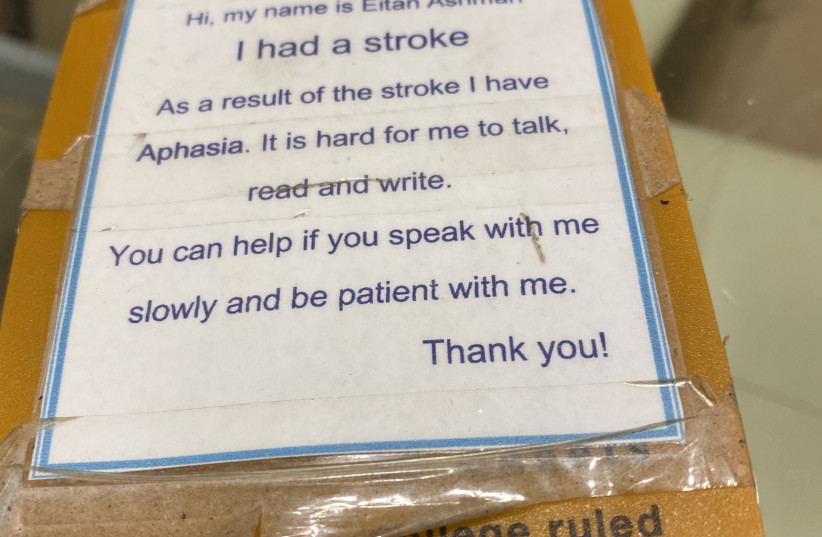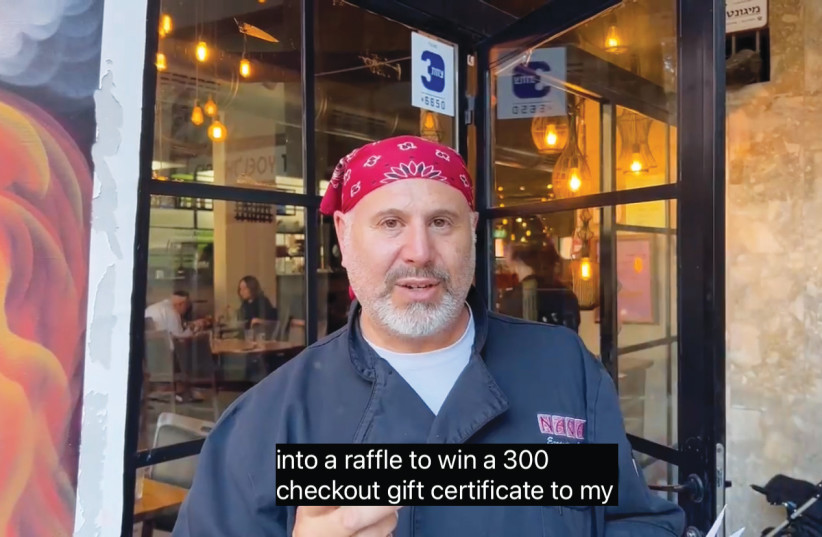Eitan Ashman just wants to be heard.
On August 6, 2017, Ashman, then 42, suffered a stroke that altered nearly every aspect of his life. Prior to his stroke, Ashman, husband to Leora and father of four, ran his own property management business, was an active MADA volunteer, a CrossFit instructor and taught Torah in his local synagogue.
All that ended suddenly when Leora found Eitan, who had been in peak physical condition with no family history of illness, on the floor of their kitchen, felled by a stroke. The only clue? Eitan had complained of a headache a few days before.
He spent three weeks in the ICU, six weeks in a neurology ward, four weeks in an in-patient rehabilitation unit and six additional months of outpatient rehabilitation. Family, friends and neighbors stepped up to take care of the Ashman children, then ages 13 to 19, providing meals, feeding their dogs and periodically relieving Leora by sitting with Eitan at his bedside.
The acute period during which Eitan and Leora’s future was scary and unknown, lasted almost two years. Eitan had to relearn how to swallow and speak. The first word that returned to him was savta, the Hebrew word for grandmother, which is what he called everyone at that early stage of his recovery. When the dust settled, Eitan was left with Broca’s Aphasia, a side effect of his stroke that makes it hard for him to communicate.
Eitan’s form of aphasia means that, while he knows what he wants to say, he has trouble getting the words out. Some days, he can speak a few words at a time, but Leora cautioned, “There’s no consistency. Each day is different.”

His speech therapist created an invaluable tool that allows Eitan to express his basic needs to his family, friends and caregivers. On each page of a small notepad, she glued an illustrated list of common items – restaurants he enjoys, names of family members, sports he likes, drinks, places he needs to go and much more.
Since Eitan knows what he wants to express but has difficulty speaking, this notebook improves the chances of him being understood when he points to an item on one of its many pages. Leora explained that there are also smartphone apps that serve the same purpose, but Eitan prefers his handmade notebook.
The notebook is his main communication tool, but the front cover text is directed toward others. It reads, “Hi, my name is Eitan Ashman. I had a stroke. As a result of the stroke I have Aphasia. It is hard for me to talk, read and write. You can help if you speak with me slowly and be patient with me. Thank you!”
For Passover this year, the family created a small booklet of insights on the Haggadah. The content, which is printed in large letters to make it easier for Eitan to read, was taken from Eitan’s own notes on the Haggadah, notes he wrote before the stroke. One of the most unintentionally prophetic insights in the booklet reads, “Today we should invite whoever we can to our Seder by using language that they can understand – whether it be through words or with gestures.”
Learning to accommodate Eitan’s new reality is an ongoing process. Leora shared that they recently replaced their rectangular dining room table with a round one, in order to make it easier for Eitan to be included in discussions at the table.
<br>Koach Eitan
Miraculously, Eitan survived the stroke. But the losses are real. Along with his ability to speak fluently, Eitan lost his career, his ability to teach Torah, his role as a volunteer with MADA and much of his long-term memory.
But he has not lost his desire to help others.
Today, nearly five years after the stroke, the Ashmans, who have always been very active in their community, are all about giving back. They established the Koach Eitan (Eitan’s strength) Initiative (www.facebook.com/koacheitan), a project of Giving Ltd., in order to raise awareness of aphasia.
Leora shared that, “Eitan’s personality of taking a challenge and not giving up is always who he was. He took the challenges and he rose above. That’s basically what he’s doing now: taking what he has and always keeps on improving.
“Koach Eitan gives Eitan purpose,” she said.
“Eitan’s personality of taking a challenge and not giving up is always who he was. He took the challenges and he rose above. That’s basically what he’s doing now: taking what he has and always keeps on improving. Koach Eitan gives Eitan purpose.”
Leora Ashman
Together, under the umbrella of Koach Eitan, the couple raises funds for stroke and aphasia awareness through the Jerusalem Marathon, creates videos to teach about aphasia and gives public talks about how to interact with people who have aphasia.
On their videos and in public talks, Eitan speaks in limited soundbites. His signature gesture is the “okay” hand gesture, accompanied by a hearty smile.
“We want to teach others about aphasia, to teach them how to be more inclusive,” Leora explained. Ultimately, their goal is nothing less than, “To make aphasia a buzzword.”

The Onion Challenge
At the beginning of June 2022, Koach Eitan created The Onion Challenge, modeled after the wildly popular ALS Ice Bucket Challenge. The Onion Challenge was designed to raise awareness during Aphasia Awareness Month in June, but the Ashmans want to keep the challenge going throughout the summer.
“This is the Aphasia Onion Challenge. Sometimes Aphasia holds your words hostage.”
What to say during the Onion Challenge
The Onion Challenge asks people to video themselves holding a raw, peeled onion and saying, “This is the Aphasia Onion Challenge. Sometimes Aphasia holds your words hostage.” Completing the challenge requires nominating at least two other people to take The Onion Challenge within 24 hours, chewing and swallowing a bite of the raw onion and posting the video on social media.
The video announcing the challenge is nothing short of endearing. Leora’s perky enthusiasm, which no doubt served her well when she coordinated youth groups in Efrat, combined with Eitan’s winsome personality, results in an upbeat video about a serious topic.
Leora shared, “So many people are challenged with aphasia and not so many know what aphasia is. Someone challenged with aphasia can feel very frustrated and isolated as aphasia affects language and speech. We want to change this and try to get more people to know what aphasia means and how to communicate better with someone who is challenged with it.”
The goal of Aphasia Awareness Month, in general, and The Onion Challenge specifically, is to increase the number of people who not only know what aphasia is, but how to better communicate with people who have aphasia. According to a survey from the [American] National Aphasia Association, nearly 85% of people they surveyed had never heard of aphasia.
Harvey Sandler of Harvey’s Smokehouse in Jerusalem not only did the Onion Challenge but created a raffle for the first 20 people who took the challenge and tagged both @Harvey’s and @KoachEitan. The winner will get a NIS 300 gift certificate to his restaurant. He also challenged fellow restaurant owner Revuen Beiser, owner of Mike’s Place.
<br>What is Aphasia?
Aphasia is a general term used for different kinds of language impairments. In the aphasia world, it is commonly said that aphasia is loss of language, not of intellect. A person with aphasia knows exactly what they want to say, but are unable to express themselves in typical ways. In some cases, aphasia can impact a person’s ability to read and write.
Aphasia is commonly caused by strokes, as in Eitan’s case, but can also be caused by traumatic brain injuries, brain tumors and other diseases. Most people with aphasia are older than Eitan, but even young children can be affected. According to Hadassah Academic College, 4,500 stroke victims in Israel develop aphasia each year. It is widely considered an invisible disability that impacts the core of a person’s identity and their ability to interact with others and participate in life.
The Ashmans can be reached at koacheitan@gmail.com.
